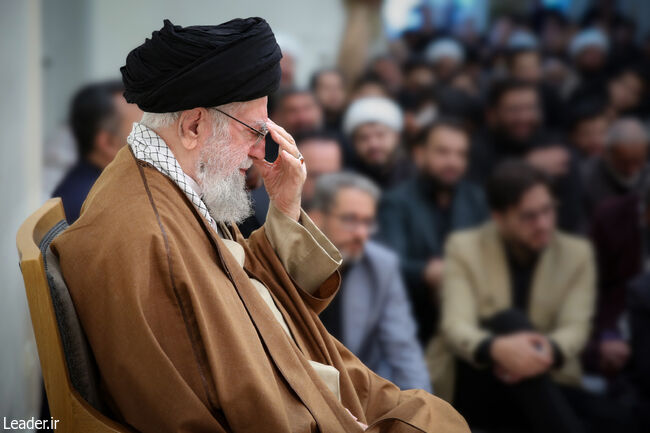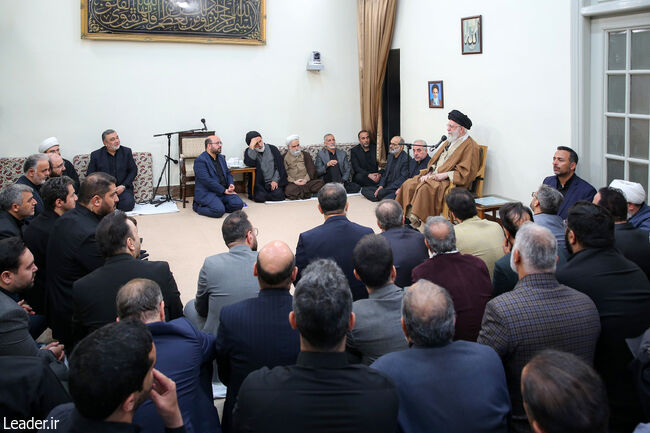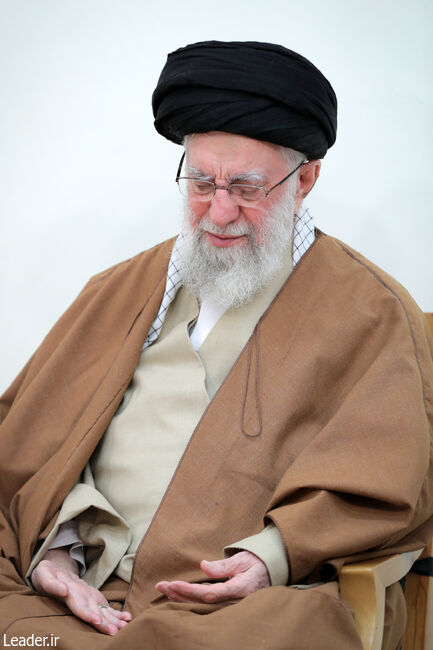A mourning ceremony marking the anniversary of the martyrdom of Imam Jaʿfar al-Ṣādiq (peace be upon him) was held on the morning of Thursday, April 23rd 2025, with the Leader of the Islamic Revolution in attendance.
Excerpts from the Leader's remarks at the conclusion of the mourning ceremony for the martyrdom anniversary of Imam Ja'far al-Sadiq (peace be upon him):
In the time of Imam al-Ṣādiq (peace and blessings be upon him), it had been ordained according to divine decree, though not necessarily an inevitable one (qaḍāʾ maḥtūm), that a transformation would occur in favour of the Imams of Guidance (peace be upon them). This can be understood from numerous narrations that have been transmitted about this. A narration from Imam al-Sadiq (peace be upon him) states: "Indeed, Allah decreed this matter in the year seventy."[i] God, the Exalted, had placed this matter — meaning the matter of true Imamate — in His decree for the year 70 AH.
You see, when Imam Hasan al-Mujtaba (peace be upon him) made peace with Muawiya, some people came to complain and protest. The Imam would say, "You do not know, perhaps it is a test for you and an enjoyment for a time." Meaning, this is temporary. It indicates that this event, this dominance of disbelief and hypocrisy, is not meant to last forever; according to Divine decree, this could be temporary. Until when? Until the year 70. According to this narration, it had been decreed that in the year 70 AH, whoever from the Ahl al-Bayt who would be alive would rise and seize governance, and true Imamate would be realised. Then the Imam continues, "But when Ḥusayn (peace be upon him) was killed, God's wrath against the people of the earth intensified, so He delayed it until the year 140." In other words, the tragedy of Karbala, people's disregard for religious principles, and their turning away had the effect of delaying this Divine decree until the year 140 [AH]. The year 140 AH corresponds to the time of Imam al-Ṣādiq (peace be upon him), who passed away in 148 AH. The Shīʿah knew this; by this, I mean that the prominent figures among the Shīʿah knew it. Thus, for example, in one narration it is mentioned that Zurārah, who, of course, was one of the close disciples (of al-Baqir and al-Sadiq), says to his companions, "You will see none upon its pulpit except Jaʿfar.[ii] (The word "aʿwād" refers to the wooden supports of the pulpit, meaning the pulpit of the caliphate.) That is, "I am seeing Jaʿfar [al-Ṣādiq] ascending and sitting upon this pulpit." To this effect.
Or in another narration, again about Zurārah, says that since he was residing in Kūfa, he sends a message to Imam al-Ṣādiq (peace be upon him) saying, "One of our brothers among the Shīʿah has fallen into debt, and his creditors are after him. Because he has no money to pay, he has left the city and has become homeless. If this matter (meaning the matter of the caliphate for which the phrase, hādhā al-amr, is used in the narration) is going to be achieved within a year or two, then he should remain [in his current situation] until you take charge, and these problems will be resolved. But if it will be delayed, then our companions should gather money and pay off his debt"[iii]. This means that someone like Zurārah was expecting that this issue would be resolved within a year or two. This is why you see that people would come to Imam al-Ṣādiq (peace be upon him) and always ask him, 'Master, why do you not rise up? Why do you not rise up?' It was because they were waiting; they had heard something, some news had reached them.
Continuing in the same narration that specified the year 140, [the Imam] said, "You revealed [the matter], so God postponed it (again).
That is, had the Shi'a rigorously kept their silence and had not disclosed [the matter], perhaps the affair would have been resolved at that very time. Just imagine how much history would have changed! The entire course of humanity would have taken a completely different path, and today's world would have been a completely different place. In other words, our shortcomings which sometimes could be because of our loose tongues, sometimes because of our failure to assist someone, sometimes because of our baseless objections, sometimes because of our impatience, or our misreading of events — can have consequences, consequences that can be historical, changing the entire course [of history]. Thus, we must be exceedingly careful."
Indeed, the life of Imam al-Ṣādiq (peace be upon him) has been truly remarkable — it was an extraordinary life; a life of great success in the propagation of divine teachings as evidenced by the vast number of narrations we have from him and his companions. Of course, when people hear about his 'four thousand students,' they might imagine the Imam holding a class with four thousand attendees sitting before him simultaneously. But this wasn't the case. Rather, over the course of his blessed life, four thousand individuals narrated from him, and that is how it has been recorded in the books of tradition. This means there have been four thousand transmitters [of his teachings]. So, it means there were four thousand of his students in this sense, not that four thousand students would be simultaneously sitting in his classes. We remain distant from truly understanding the lives of the Imams (peace be upon them). Our knowledge is limited, whether of their words, their teachings, their narrations, or the conditions of their lives.
As for those accounts in our narrations that claim that there was an occasion when Imam al-Sadiq was called before Mansur (the Abbasid caliph), and the latter had expressed his intense anger toward him, the narration goes that the Imam supposedly said, "O cousin! The great ones, the oppressed prophets, forgave, so you too should forgive us." I categorically declare these accounts to be false. Indeed, such a thing never happened. The Imam would never speak to anyone in such a manner. Whether he was under the threat of death or not, it makes no difference. The Imam simply does not speak this way." Who is the narrator of this account? Rabīʿ. Rabīʿ, Mansur's lackey. This means that he was a right-hand man of Manṣūr, a courtier, a professional liar, someone of that sort. It is this individual who came and narrated that Imam al-Ṣādiq had supposedly spoken in that manner. Clearly, such reports serve only to demoralise the Shi'a, which is precisely why we must categorically reject these fabrications and not transmit them at all. Some people mindlessly repeat these narrations, even though they are utterly unreliable. The Imams imparted lessons of steadfastness, lessons of resistance, and lessons in reasoned argument, and in speaking with logic and reasoned argument, they would overcome their opponents.
Just look at how Lady Zaynab spoke in the court of Ibn Ziyād and the court of Yazīd. This is the line! This is the correct line of the Imams. Whoever stands firm today is moving in accordance with the line of these great individuals. Even today, those who are standing firm in Gaza and Lebanon are indeed acting in accordance with the line of these Imams of religion, the Imams of guidance.
The Leader of the Islamic Revolution Praises the Qur'an Programs of the Blessed Month of Ramadan
At the end of the ceremony, which was attended by a group of Quranic activists and organisers of national media programs during the holy month of Ramadan, Ayatollah Khamenei said, "Today, thanks be to God, our gathering is blessed with people of the Quran. This year, the blessed month of Ramadan was truly a Qur'anic Ramadan. Thanks be to God. Across the country, thanks to the efforts of you brothers, in every place, in every sector, whether on national broadcasting or beyond it, people's hearts were connected to the Qur'an. This is what we need. This is what our country needs, what our youth need—the recitation of the Qur'an, the memorisation of the Qur'an. When I see the youth sitting there, reciting the Qur'an with tartīl (measured, rhythmic recitation), when a memoriser recites from memory, I am profoundly moved with joy and gratitude. Alhamdulillahi Rabbi' l-‘Alamin (Praise be to Allah, Lord of the Worlds). Keep this momentum. However, we still have much work to do in Quranic endeavours. There are still tasks that must be accomplished. We must spread the meanings of the Qur'an, which is a vast and profound ocean, among our people and among the readers of the Qur'an. Praise God; it was very good. Thanks be to God.



